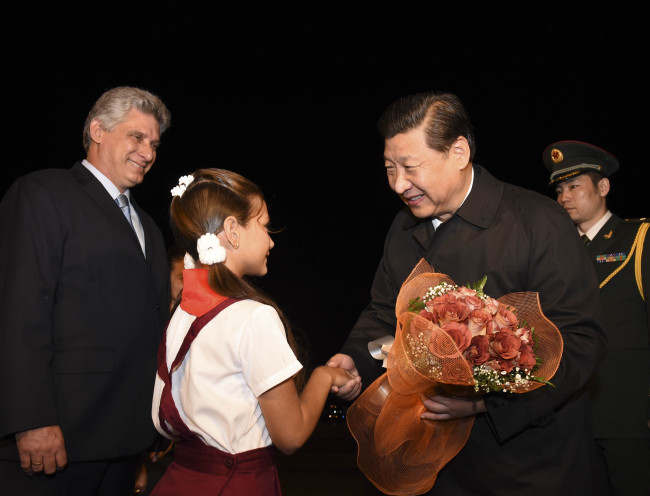Xi eyes increased investment in Cuba
China’s president signs oil and mineral deals with Venezuela
By Korea HeraldPublished : July 22, 2014 - 20:46
HAVANA (AFP) ― Chinese President Xi Jinping is visiting Cuba with hopes of expanding political and economic ties in the fellow communist nation.
The tour of the Americas’ only one-party communist nation is the last leg of a weeklong trip in the region that has already taken Xi to Brazil, Argentina and Venezuela, as he reaches out to resource-rich economies often shunned by the United States and Europe.
The Chinese leader arrived in Havana late Monday from Caracas for the two-day official visit.
Xi aims to make his country ― already Cuba’s second-largest trading partner after Venezuela and its primary source of credit ― a major investor on the Caribbean island.
Coinciding with his trip, about 50 Chinese entrepreneurs traveled to Havana to explore business opportunities, attracted by foreign investment incentives and the future Mariel free trade zone outside the capital.
The tour of the Americas’ only one-party communist nation is the last leg of a weeklong trip in the region that has already taken Xi to Brazil, Argentina and Venezuela, as he reaches out to resource-rich economies often shunned by the United States and Europe.
The Chinese leader arrived in Havana late Monday from Caracas for the two-day official visit.
Xi aims to make his country ― already Cuba’s second-largest trading partner after Venezuela and its primary source of credit ― a major investor on the Caribbean island.
Coinciding with his trip, about 50 Chinese entrepreneurs traveled to Havana to explore business opportunities, attracted by foreign investment incentives and the future Mariel free trade zone outside the capital.

“We want Chinese businessmen to invest in Cuba and partner with Cuban companies,” said Cuba’s director general for foreign investment, Deborah Rivas.
On Tuesday, Xi meets with President Raul Castro, 83, at the Palace of the Revolution. The two leaders are expected to sign unspecified bilateral agreements.
The second day of his visit will take him to Santiago de Cuba, the country’s second-largest city, hit hard by Hurricane Sandy in October 2012.
The storm killed 11 people, destroyed 17,000 homes and damaged thousands more. Xi is expected to announce Chinese cooperation in the city, perhaps in rebuilding housing.
The Chinese president may also pay a visit to retired revolutionary leader Fidel Castro, 87, who led Cuba for five decades until he stepped aside eight years ago during a health crisis.
In Caracas, Xi signed a raft of oil and mineral deals with Venezuela.
They included $4 billion for a joint development fund, $691 million to explore Venezuela’s gold and copper reserves and an agreement to develop the countries’ third joint satellite.
“Venezuela has become one of the top countries for Chinese investment ... our seventh oil supplier and fourth Latin American trade partner,” Xi said in Caracas.
The Venezuela visit came after the Chinese leader agreed to an $11 billion currency swap with Argentina and extended much-needed investment to President Cristina Kirchner, whose cash-strapped government, locked out of capital markets since defaulting on its debt in 2001, is staring down the threat of another default.
Xi kicked off his tour last week by proposing a new $20 billion infrastructure fund for Latin America, underlining the fast-growing Asian giant’s increasing interest in the region.
He also launched a new $50 billon development bank along with the other emerging powers of the so-called BRICS group ― Brazil, Russia, India and South Africa ― at a summit in Brazil.
Castro hailed the move, which creates an alternative to the Western-dominated World Bank, was hailed as contributing to “a new international order.”
Chinese trade with Latin America has grown rapidly in recent years, reaching $261.6 billion in 2013. China is now the second-largest trading partner of many countries, including Argentina and Cuba, and has been Brazil’s largest since 2009.
By contrast China ranked just 17th in 1990 on the list of Latin American export destinations.
Beijing has also ramped up investment in the region to about 20 percent of its total foreign direct investment of $90 billion last year.
This is Xi’s second visit to Latin America and the Caribbean since taking office in 2013. Last year he toured Mexico, Costa Rica, and Trinidad and Tobago.
-
Articles by Korea Herald







![[KH Explains] No more 'Michael' at Kakao Games](http://res.heraldm.com/phpwas/restmb_idxmake.php?idx=644&simg=/content/image/2024/04/28/20240428050183_0.jpg&u=20240428180321)

![[Weekender] How DDP emerged as an icon of Seoul](http://res.heraldm.com/phpwas/restmb_idxmake.php?idx=644&simg=/content/image/2024/04/25/20240425050915_0.jpg&u=)








![[Herald Interview] Mistakes turn into blessings in street performance, director says](http://res.heraldm.com/phpwas/restmb_idxmake.php?idx=652&simg=/content/image/2024/04/28/20240428050150_0.jpg&u=20240428174656)
